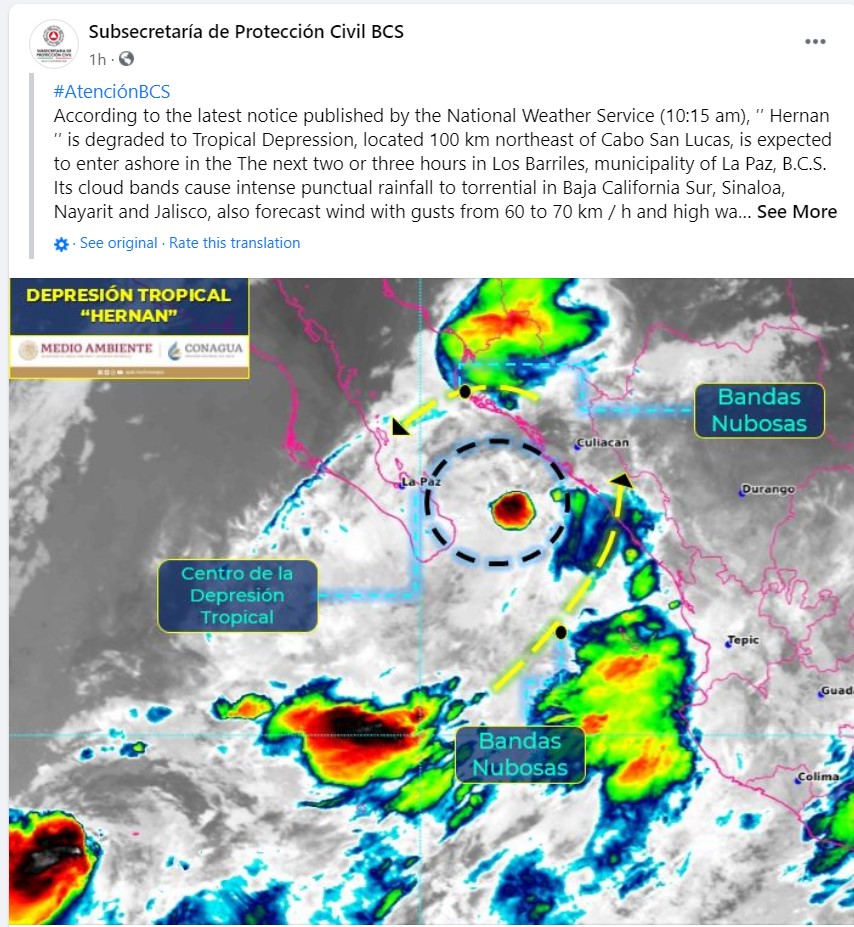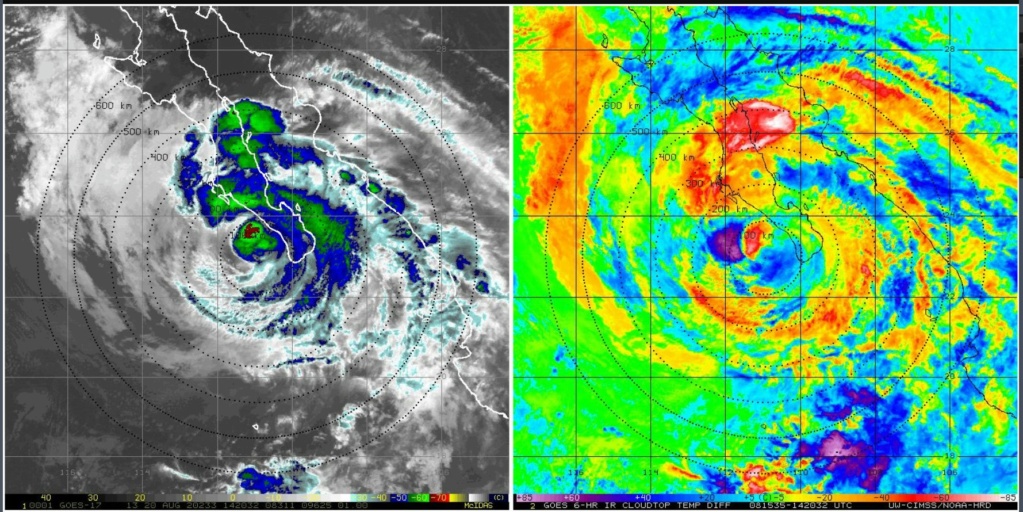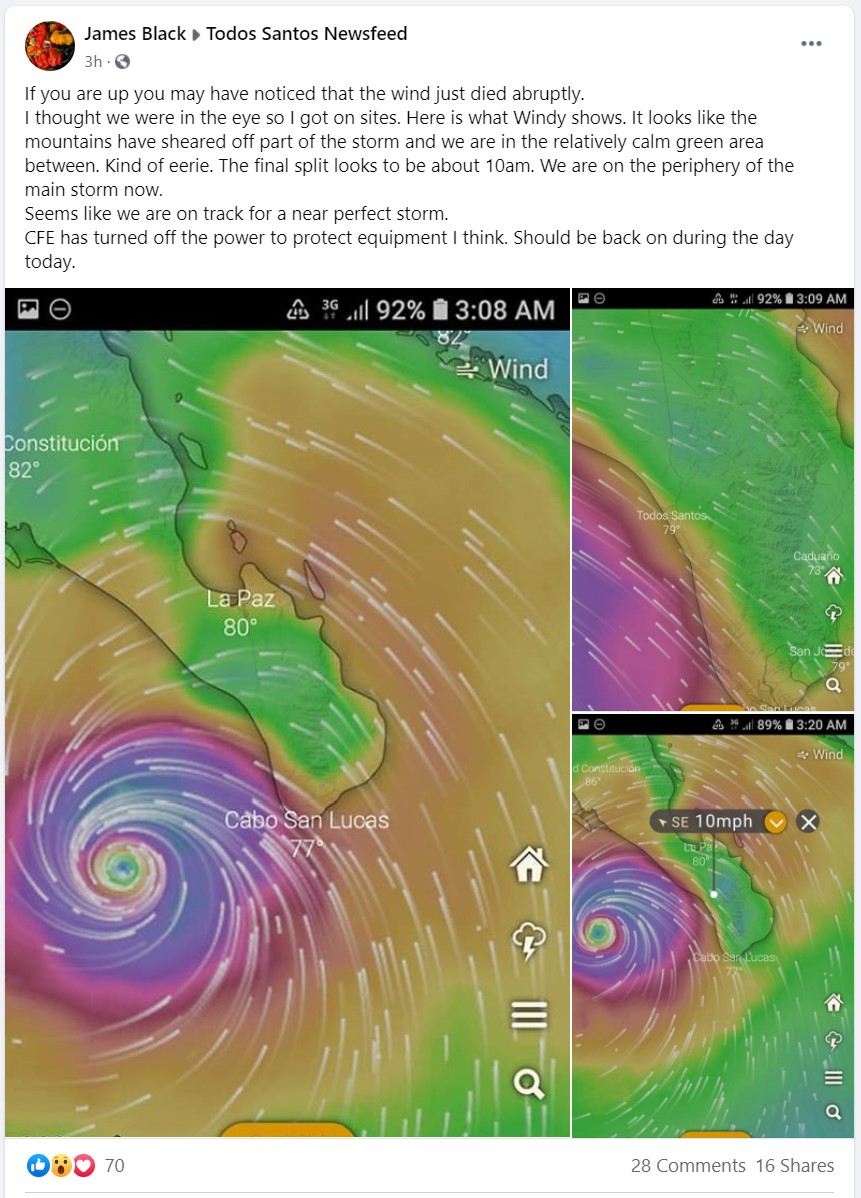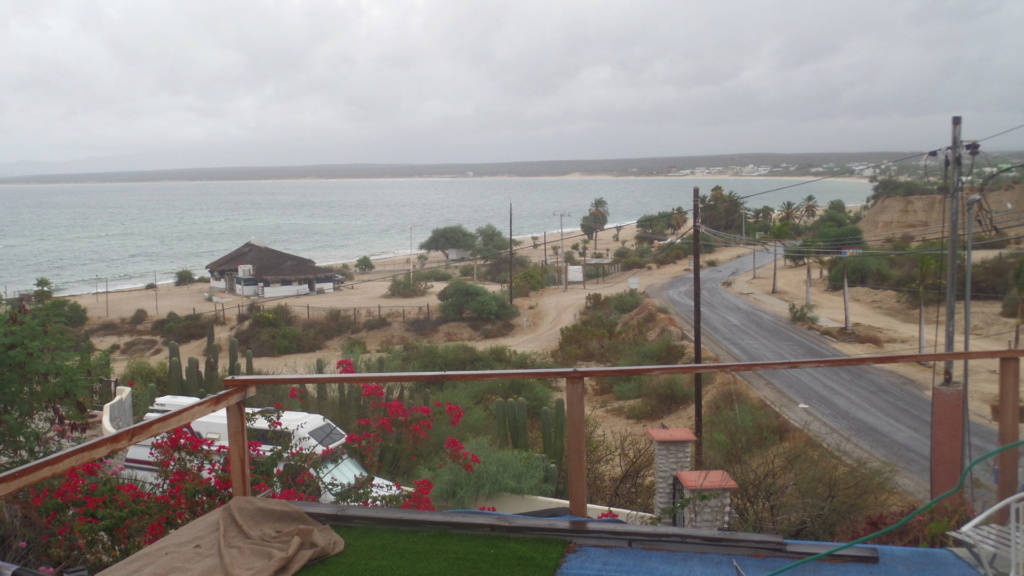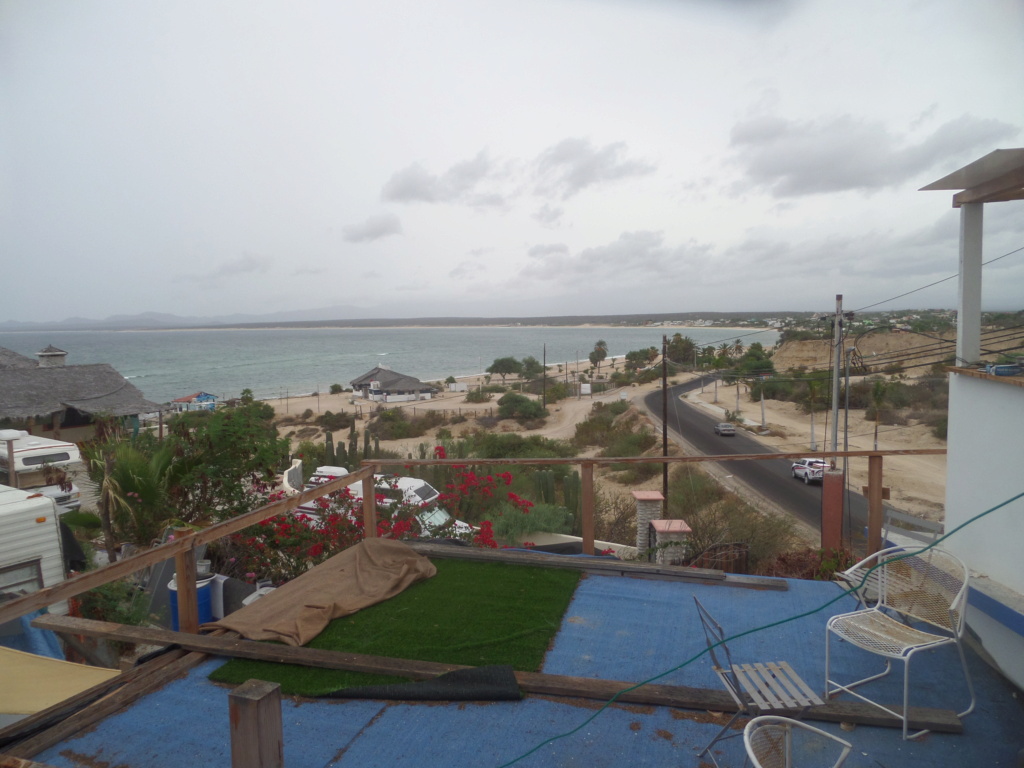hurricanes 2020
Page 1 of 1
 Re: hurricanes 2020
Re: hurricanes 2020
well a no significant direct hit hurricane year on the entire baja....
our rain total is less than a quarter inch for the summer.
our rain total is less than a quarter inch for the summer.
dean- Posts : 5539
Join date : 2008-01-01
 Re: hurricanes 2020
Re: hurricanes 2020
my proper rain gauge showed a total of 0.1 inches of rain from the storm.
no significant damage and I think we had 60mph guests for a very short time and sustained my guess is 30mph.
no significant damage and I think we had 60mph guests for a very short time and sustained my guess is 30mph.
dean- Posts : 5539
Join date : 2008-01-01
 Re: hurricanes 2020
Re: hurricanes 2020
nice cool winds right now about 80 degrees. very gusty. my rain gauge showed 0.100 rain so far.
dean- Posts : 5539
Join date : 2008-01-01
 Re: hurricanes 2020
Re: hurricanes 2020
our strongest winds hitting now. till now much. Power went off momentarily.
dean- Posts : 5539
Join date : 2008-01-01
 Re: hurricanes 2020
Re: hurricanes 2020
still no major rain and ver minor winds. 8pm
dean- Posts : 5539
Join date : 2008-01-01
 Re: hurricanes 2020
Re: hurricanes 2020
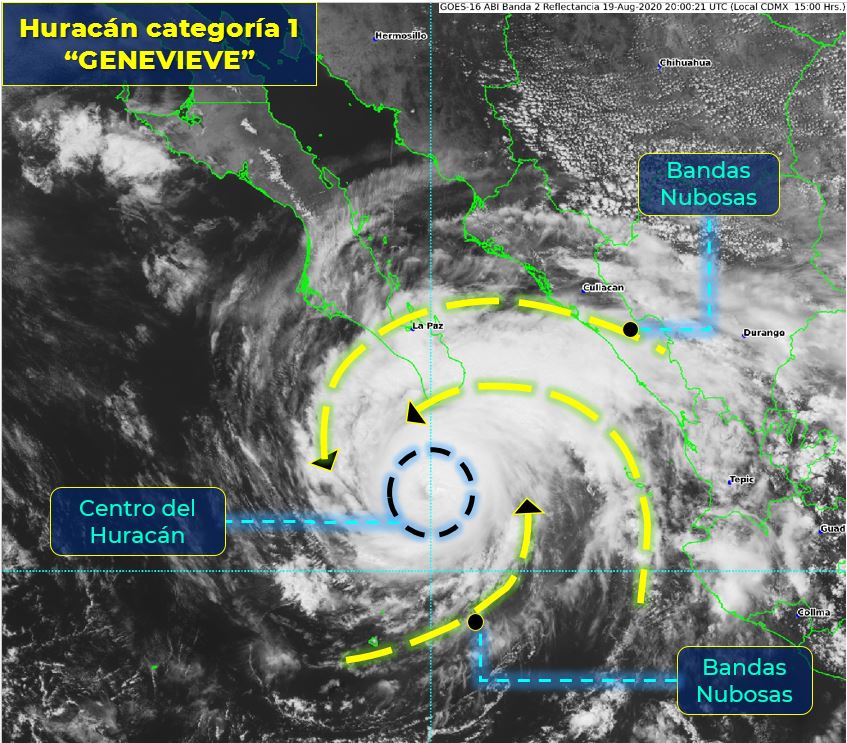
https://smn.conagua.gob.mx/es/pronosticos/avisos/aviso-de-ciclon-tropical-en-el-oceano-pacifico?fbclid=IwAR1v_MMl25psQo0CJOaGnpd97B89LHh1GauPOacRKqTHMrOBfs6TaCiTyec
https://weather.com/weather/radar/interactive/l/370b1147fa4ec05351749f31004bee089f7f3f0d568ec17e9ed6c9ac4f94295f?base=roadsLight&layer=satir&series=observation&zoom=6.10&opacity=70¢er=23.25%2C-110.28&overlays=tropicalstorms&fbclid=IwAR0iPoSZud5acM_qI6L4ABA9bXlq4edX2cfvNbrcrz8L98f1Ji15Y6lUYYA
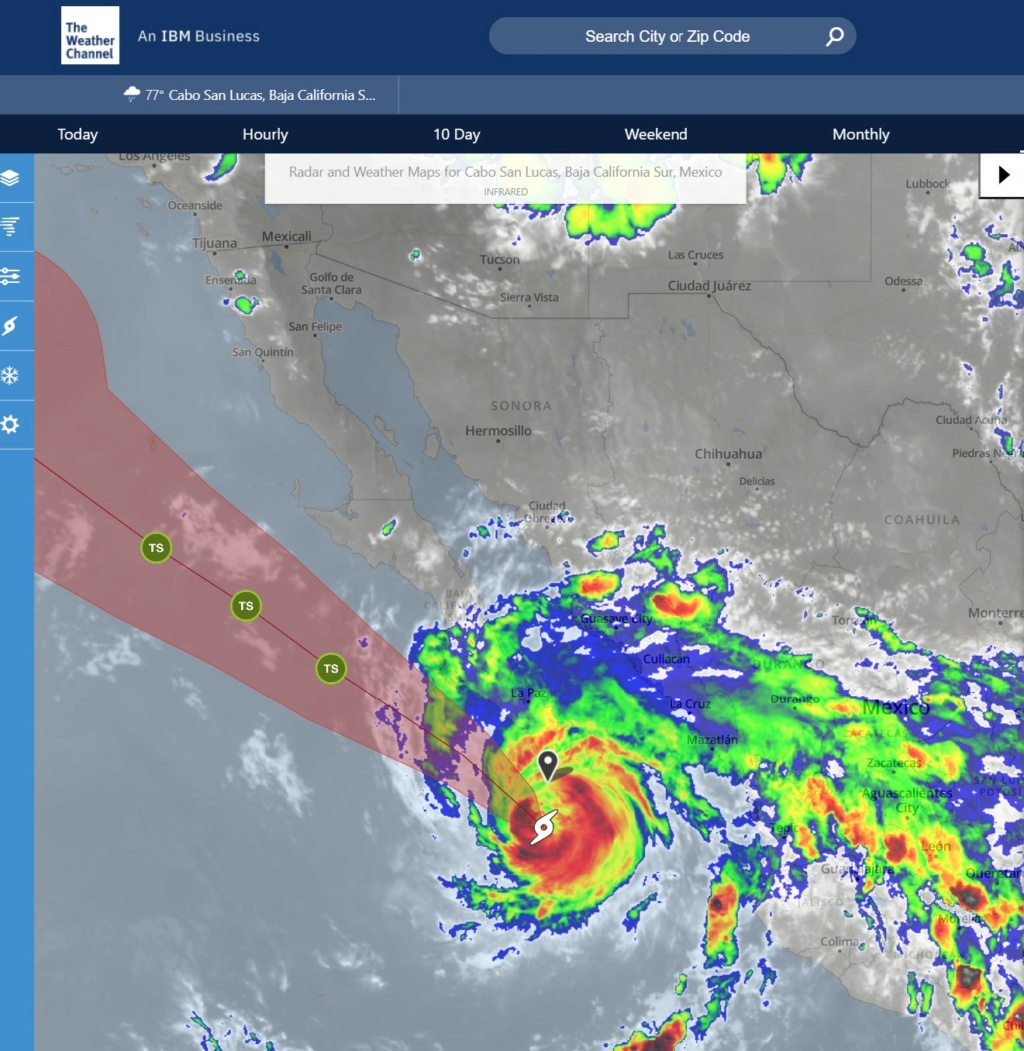
dean- Posts : 5539
Join date : 2008-01-01
 Re: hurricanes 2020
Re: hurricanes 2020
https://travel.state.gov/content/travel/en/international-travel/before-you-go/travelers-checklist.html
https://smn.conagua.gob.mx/es/
https://smn.conagua.gob.mx/es/
dean- Posts : 5539
Join date : 2008-01-01
 hurricanes 2020
hurricanes 2020
Weather Update - U.S. Embassy, Mexico (June 2, 2020)
Location: Mexico
Event: Mexico’s hurricane season for the Atlantic and Eastern Pacific is underway. The season officially runs until November 30, though historically most cyclones develop between July and October. Hurricanes and tropical storms can cause life-threatening flash flooding, dangerous winds, treacherous surf and rip currents, and other hazardous conditions. Torrential rains from these storms can cause flooding hundreds of miles inland, sometimes persisting for several days after the storm has passed or dissipated.
In the aftermath of a storm, there might be widespread damage to infrastructure (such as roads, electricity, water supply, and phone and internet service) and serious shortages of habitable accommodations, food, water, and medical facilities. Storms can result in airport closures or limited flight availability due to runway or terminal damage and a shortage of electricity. U.S. citizens in affected regions might face delays returning home and could even need to stay in emergency shelters with limited food, water, medicine, and other supplies. These shelters may be subject to additional limitations because of sanitary protocols in place due to COVID-19. Difficulties returning home could be exacerbated by local COVID-19 travel restrictions and reduced flight schedules during this hurricane season.
Actions to Take:
Visit our Embassy webpage on COVID-19 for information on conditions in Mexico.
If you are a U.S. citizen traveling to or residing in Mexico, enroll in the Smart Traveler Enrollment Program (STEP) to receive safety messages and other travel information.
Ensure your U.S. travel documents are up-to-date, and store copies of them along with insurance and other personal papers in a safe place. Keep them in a watertight plastic bag or container for extra protection. If you need to make an appointment for an emergency passport application, please contact your local consulate or the Embassy.
For those living in Mexico, prepare your family’s emergency hurricane kit to include essential items you might need for at least 72 hours following a storm if you were unable to access outside resources. Kits might include batteries, flashlights, nonperishable food, and water. Don’t forget to consider prescription medications and any other supplies for children, elderly family members, or pets.
Monitor the U.S. National Hurricane Center, the Mexican National Meteorological Service (Servicio Meteorológico Nacional), and the Mexican Civil Protection Agency (Protección Civil) for updates on storm activity and emergency response.
If a storm watch or warning is issued, monitor the local news for updates, follow directions from local officials, and in case of emergency call 911.
Keep your friends and loved ones up-to-date about your whereabouts – via phone, text, social media, etc. – and let them know you are safe when possible.
Visit the Department of State’s Hurricanes, Typhoons, and Cyclones page for more information.
Assistance:
For Emergency Assistance for U.S. citizens in Mexico, call +52-55-8526-2561 from Mexico or +1-844-528-6611 from the United States.
The U.S. Embassy in Mexico City is located at:
Paseo de la Reforma 305
Colonia Cuauhtémoc
06500, Ciudad de México
Phone: +52-55-5080-2000
Fax: +52-55-5080-2005
E-Mail: ACSMexicoCity@state.gov
State Department – Consular Affairs: +1-888-407-4747 or +1-202-501-4444
Enroll in the Smart Traveler Enrollment Program (STEP) to receive Alerts and make it easier to locate you in an emergency.
Follow the Department of State on Facebook and Twitter.
Follow the U.S. Embassy in Mexico on Facebook and Twitter.
Review Mexico Country Information.
Review the Crime and Safety Reports for Mexico.
Prepare a contingency plan for emergency situations. Review the Traveler’s Checklist.
Location: Mexico
Event: Mexico’s hurricane season for the Atlantic and Eastern Pacific is underway. The season officially runs until November 30, though historically most cyclones develop between July and October. Hurricanes and tropical storms can cause life-threatening flash flooding, dangerous winds, treacherous surf and rip currents, and other hazardous conditions. Torrential rains from these storms can cause flooding hundreds of miles inland, sometimes persisting for several days after the storm has passed or dissipated.
In the aftermath of a storm, there might be widespread damage to infrastructure (such as roads, electricity, water supply, and phone and internet service) and serious shortages of habitable accommodations, food, water, and medical facilities. Storms can result in airport closures or limited flight availability due to runway or terminal damage and a shortage of electricity. U.S. citizens in affected regions might face delays returning home and could even need to stay in emergency shelters with limited food, water, medicine, and other supplies. These shelters may be subject to additional limitations because of sanitary protocols in place due to COVID-19. Difficulties returning home could be exacerbated by local COVID-19 travel restrictions and reduced flight schedules during this hurricane season.
Actions to Take:
Visit our Embassy webpage on COVID-19 for information on conditions in Mexico.
If you are a U.S. citizen traveling to or residing in Mexico, enroll in the Smart Traveler Enrollment Program (STEP) to receive safety messages and other travel information.
Ensure your U.S. travel documents are up-to-date, and store copies of them along with insurance and other personal papers in a safe place. Keep them in a watertight plastic bag or container for extra protection. If you need to make an appointment for an emergency passport application, please contact your local consulate or the Embassy.
For those living in Mexico, prepare your family’s emergency hurricane kit to include essential items you might need for at least 72 hours following a storm if you were unable to access outside resources. Kits might include batteries, flashlights, nonperishable food, and water. Don’t forget to consider prescription medications and any other supplies for children, elderly family members, or pets.
Monitor the U.S. National Hurricane Center, the Mexican National Meteorological Service (Servicio Meteorológico Nacional), and the Mexican Civil Protection Agency (Protección Civil) for updates on storm activity and emergency response.
If a storm watch or warning is issued, monitor the local news for updates, follow directions from local officials, and in case of emergency call 911.
Keep your friends and loved ones up-to-date about your whereabouts – via phone, text, social media, etc. – and let them know you are safe when possible.
Visit the Department of State’s Hurricanes, Typhoons, and Cyclones page for more information.
Assistance:
For Emergency Assistance for U.S. citizens in Mexico, call +52-55-8526-2561 from Mexico or +1-844-528-6611 from the United States.
The U.S. Embassy in Mexico City is located at:
Paseo de la Reforma 305
Colonia Cuauhtémoc
06500, Ciudad de México
Phone: +52-55-5080-2000
Fax: +52-55-5080-2005
E-Mail: ACSMexicoCity@state.gov
State Department – Consular Affairs: +1-888-407-4747 or +1-202-501-4444
Enroll in the Smart Traveler Enrollment Program (STEP) to receive Alerts and make it easier to locate you in an emergency.
Follow the Department of State on Facebook and Twitter.
Follow the U.S. Embassy in Mexico on Facebook and Twitter.
Review Mexico Country Information.
Review the Crime and Safety Reports for Mexico.
Prepare a contingency plan for emergency situations. Review the Traveler’s Checklist.
dean- Posts : 5539
Join date : 2008-01-01
Page 1 of 1
Permissions in this forum:
You cannot reply to topics in this forum

